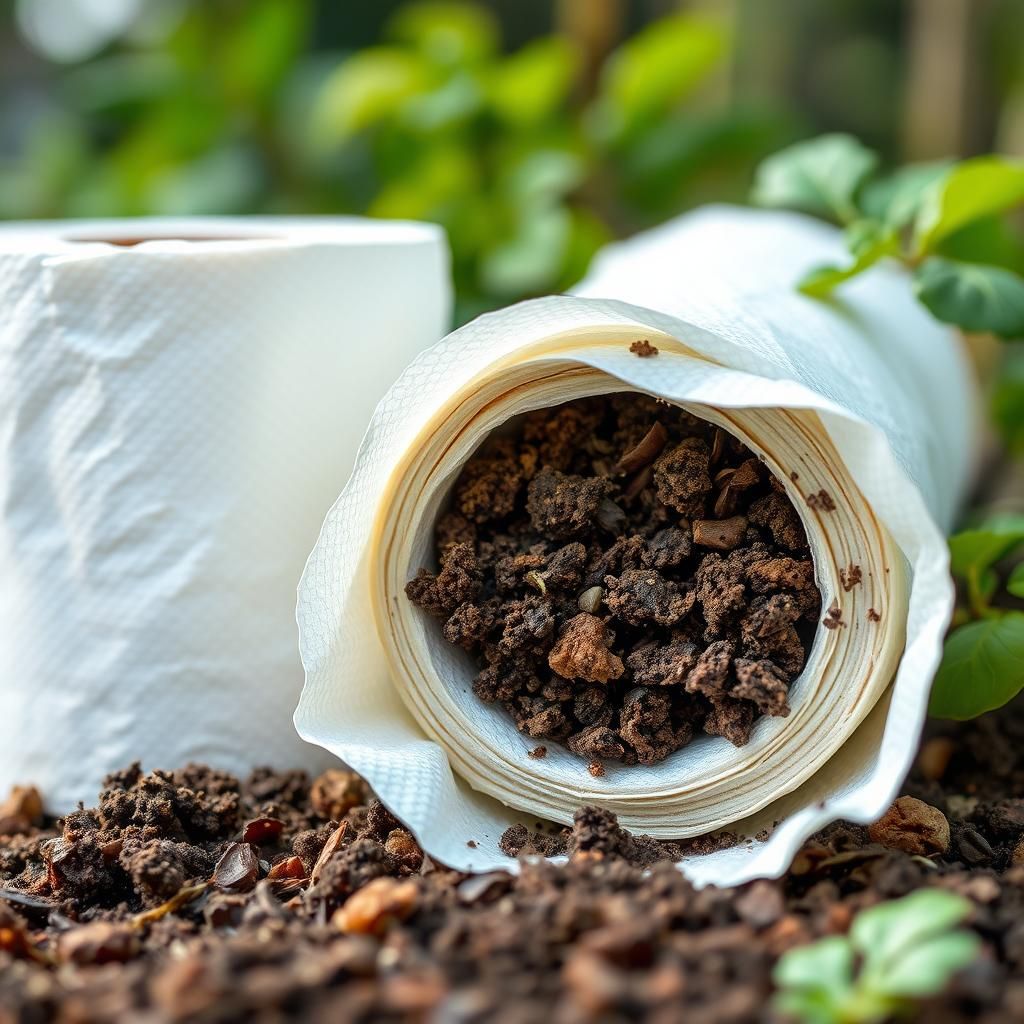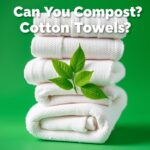Can I Throw Paper Towels in Compost? Understanding Composting Guidelines and Tips

When it comes to composting, many enthusiasts often wonder about the materials they can include in their compost bins. A common question is whether paper towels are compostable. Understanding composting guidelines is essential for creating nutrient-rich compost while minimizing waste. In this article, we will explore the compostability of paper towels, examining the types of towels that are suitable for composting and those that should be avoided. Additionally, we will provide valuable tips for integrating paper towels into your composting routine effectively. Discover how to navigate the complexities of composting to maximize the benefits for your garden and the environment.
Can I Throw Paper Towels in Compost?
While throwing away paper towels in the compost might seem convenient, the answer is not straightforward. Most paper towels are made from recycled materials and can contain traces of chemicals, oils, or other contaminants that may not be suitable for composting. If the paper towels are used for cleaning up food spills or are made from biodegradable materials and are free from harmful substances, they can be composted in small quantities. However, it's essential to check the packaging or manufacturer’s guidelines for any specific recommendations before adding them to your compost pile to ensure you are keeping your compost healthy and safe.
What Types of Paper Towels Are Compostable?
Many types of paper towels can be composted if they are made from natural fibers and do not have added chemicals. For instance, unbleached paper towels that have been used only for cleaning up food-related messes (like fruits and vegetables) can typically be added to your compost. However, towels that have been used with chemicals, oil, or other non-organic materials should be avoided as they may introduce harmful substances into the compost.
How to Compost Paper Towels Properly?
To compost paper towels properly, tear them into smaller pieces to help them break down more quickly in the compost pile. Ensure that the towels are free of any non-compostable residues; rinsing or scrubbing off any noticeable cleaning agents is advisable. Mix them with green materials (like kitchen scraps) and brown materials (like dried leaves) to maintain a balanced carbon-to-nitrogen ratio, facilitating better decomposition.
Are Used Paper Towels Safe for Composting?
Used paper towels can be safe for composting if they have been used exclusively for biodegradable or organic materials, like fruits or vegetables. They pose no harm to compost if they are free from synthetic cleaning agents or non-biodegradable substances. However, if they contain traces of cleaning chemicals, it's best to dispose of them in regular garbage to prevent contamination of your compost.
What About Paper Towels with Food Contaminants?
If paper towels have been used to clean up organic food waste, such as fruits, vegetables, or even small amounts of meat (which is often discouraged), they can usually be composted. However, towels used with highly processed foods or those containing fats or oils may cause issues in the compost pile by attracting pests or creating odors. It's crucial to evaluate what substances the paper towels have come into contact with before deciding to compost them.
Tips for Reducing Waste from Paper Towels
To minimize the need for paper towels, consider using reusable cloths or rags for cleaning tasks around the house. Implementing methods like composting kitchen scraps, practicing better meal prep techniques, and utilizing washable alternatives can significantly reduce paper towel consumption. This not only contributes to sustainability by reducing waste but also enhances the quality of compost, making it richer and more beneficial for your garden.
| Type of Paper Towel | Compostable? |
|---|---|
| Unbleached, Food-related use | Yes |
| Bleached, Chemical residue | No |
| Used with organic food | Yes |
| Used with oils or chemicals | No |
| Non-biodegradable paper towels | No |
Is it okay to put paper towels in compost?

When it comes to composting, many people wonder about the suitability of different materials, including paper towels. Generally, composting paper towels is acceptable, provided they meet certain criteria. Most paper towels are made from biodegradable materials and are often composed of recycled paper. However, it is important to consider the type of chemicals or cleaners that may have been used on them. If the paper towels are relatively clean and free from harsh chemicals, they can provide carbon material to your compost pile.
Types of Paper Towels
Different types of paper towels exist, which can influence their compostability.
- Unbleached paper towels: These are made with minimal processing and are ideal for composting.
- Bleached paper towels: Often treated with chemicals that may not be compostable, it's best to avoid these.
- Reusable cloth towels: While not paper towels, they are a sustainable alternative that can be composted when they no longer serve their purpose.
Contamination Concerns
Contamination is a significant concern when composting paper towels.
- Chemical residues: If the towels have been used with strong cleaners or chemicals, they could introduce harmful substances into the compost.
- Food waste contamination: Towels used for wiping food spills should be considered carefully, as they may introduce pathogens.
- Plastic films: Some paper towels may have plastic layers; check labels to ensure they are 100% paper.
How to Compost Paper Towels Effectively
Proper composting methods can enhance the benefits of paper towels in compost.
- Shred the towels: Cutting or tearing the towels into smaller pieces can accelerate decomposition.
- Mix with greens: Combine paper towels with nitrogen-rich materials like food scraps to balance the carbon-to-nitrogen ratio.
- Aerate the compost pile: Ensuring good airflow helps break down the paper towels faster and prevents odors.
Benefits of Composting Paper Towels
Composting paper towels can contribute positively to your compost pile.
- Carbon source: They add necessary carbon, which helps create a balanced compost mixture.
- Improves soil structure: As they break down, they can enhance aeration and water retention in the soil.
- Reduces waste: Composting paper towels diverts them from landfills, contributing to a more sustainable environment.
Alternatives to Composting Paper Towels
If you're unsure about composting paper towels, consider these alternatives.
See also:
- Waste disposal: If the paper towels are contaminated, dispose of them in regular trash to avoid contaminating the compost.
- Recycling: Some paper towels can be recycled, but check local guidelines as this varies by location.
- Composting alternatives: Use shredded cardboard or natural fibers as a carbon source if you prefer not to compost paper towels.
What three items should not be placed in a compost pile?

When managing a compost pile, it is crucial to understand what can and cannot be included to ensure the health of the compost and to facilitate the process of decomposition. Here are three items that should never be placed in a compost pile:
1. Meat and Fish Scraps: These items are often rich in fats and oils that can lead to unpleasant odors and attract pests. Decomposing meat and fish can also introduce harmful pathogens into the compost, making it unsafe for future use.
2. Dairy Products: Similar to meat and fish, dairy products such as milk, cheese, and yogurt can create strong odors and attract unwanted animals. Additionally, they can spoil and create an environment that fosters harmful bacteria, which is detrimental to the composting process.
3. Oils and Fats: While some oils can be beneficial in small amounts, large quantities of oils and fats can inhibit the decomposition process. They create a greasy layer that prevents air from circulating within the compost pile, leading to anaerobic conditions which can cause foul smells and slow down the breakdown of organic material.
Why Meat and Fish Scraps are Harmful
Including meat and fish in a compost pile can have several negative consequences. Primarily, they attract pests such as rats and raccoons, which can cause disturbances in your composting area. Additionally, the decay of these proteins can also produce harmful bacteria that pose risks to both humans and plants. Lastly, the odor that emanates from rotting meat can be quite unpleasant, making your compost pile a source of nuisance rather than a resource.
- Pests like rodents and insects are attracted to meat.
- Possible introduction of harmful bacteria.
- Unpleasant odors can make composting less appealing.
Effects of Dairy Products in Compost
Adding dairy products to your compost can create several unwanted issues. Dairy is notorious for producing strong odors as it breaks down. This not only makes the compost site less pleasant but also can deter some beneficial organisms essential for decomposition. Furthermore, dairy can lead to an imbalance in the C:N (carbon to nitrogen) ratio, hindering the composting process.
- Strong odors can attract unwanted wildlife.
- Imbalance in compost chemistry can hinder decomposition.
- May introduce pathogens harmful to soil health.
Impact of Oils and Fats
Including oils and fats in a compost pile can result in a problematic composting environment. These substances create a barrier that traps moisture and air, preventing aerobic microorganisms from thriving. This anaerobic environment can lead to unpleasant smells and inefficient breakdown of organic matter, ultimately undermining the quality of the compost you are trying to produce.
- Creates anaerobic conditions detrimental to composting.
- Leads to unpleasant odors and slow decomposition.
- Can result in a greasy, unmanageable compost pile.
Alternatives to Non-Compostable Items
Instead of adding products that should not be composted, consider alternatives that enhance the composting process. For example, you can use vegetable scraps such as peels, stems, and cores. These materials break down more easily and add valuable nutrients to your compost. Coffee grounds, eggshells, and garden waste are also excellent choices for a thriving compost pile.
- Vegetable scraps are safe and nutritious for compost.
- Coffee grounds provide nitrogen and improve soil structure.
- Eggshells add calcium, promoting healthy plant growth.
Best Practices for Healthy Composting
To maintain a successful compost pile, follow several best practices. Keep a balanced ratio of green materials (rich in nitrogen) and brown materials (rich in carbon) to encourage efficient decomposition. Regularly turn the pile to aerate it and speed up the process, and monitor moisture levels to ensure the right environment for microorganisms. Lastly, avoid adding any non-compostable items to keep your compost healthy and productive.
- Maintain an optimal carbon to nitrogen ratio.
- Turn the pile regularly for aeration.
- Monitor moisture levels for optimal decomposition.
Can greasy paper towels be composted?

Greasy paper towels are often a topic of discussion when it comes to composting. The general rule is that greasy or oil-soaked paper towels should not be composted in traditional compost systems. The reason for this is primarily due to the difficulty in breaking down fats and oils in a compost environment, which can lead to various complications.
Why Are Greasy Paper Towels Problematic for Composting?
Greasy paper towels can introduce issues in the composting process due to their high oil and fat content. When fats are added to compost, they can cause several problems:
- Odor issues: Oils can lead to unpleasant aromas as they break down.
- Attracting pests: The smell of grease may attract rodents and other pests that can disrupt the composting process.
- Slow decomposition: Grease can create a barrier that inhibits the breakdown of organic materials.
Alternative Ways to Dispose of Greasy Paper Towels
Instead of composting, there are other environmentally friendly options for disposing of greasy paper towels. Consider:
See also:
- Trash disposal: Place greasy towels in the trash, where they will go to a landfill.
- Hazardous waste facilities: If large quantities are involved or if they contain chemicals, check local guidelines for hazardous disposal.
- Recycling programs: Some areas may have specific recycling programs that accept certain paper products, although greasy items are generally excluded.
What Can Be Done with Non-Greasy Paper Towels?
When it comes to the disposal of non-greasy paper towels, there are viable composting options. In this case:
- Composting: Non-greasy paper towels can be safely added to compost piles as they are a source of carbon.
- Bedding for pets: Shredded non-greasy towels can serve as bedding for pets in an environmentally friendly alternative.
- Craft projects: Clean paper towels can be repurposed for various arts and crafts activities.
Composting Tips for Kitchen Waste
For those aiming to compost kitchen waste, it's crucial to know what can and cannot be included. Consider the following tips:
- Focus on greens and browns: Use a balanced mix of nitrogen-rich 'greens' and carbon-rich 'browns.'
- Chop materials small: Smaller pieces decompose faster, making the composting process more efficient.
- Aerate regularly: Turn the compost pile to ensure oxygen reaches all layers and promotes faster decomposition.
Understanding Oil and Fats in Composting
Oils and fats have specific characteristics that make them unsuitable for composting. It is essential to understand their impact:
- Hygiene concerns: They can harbor pathogens that may contaminate the compost.
- Imbalance in microbial activity: Fats disrupt the microbial balance necessary for effective composting.
- Affecting temperature: Oils can prevent the heat generated in compost from reaching necessary levels for decomposition.
Is Bounty paper towels compostable?

Bounty paper towels are not compostable. While they may seem like a more environmentally friendly option compared to some other paper products due to their absorbency and strength, they are typically made with a combination of virgin paper fibers and sometimes contain synthetic materials or chemicals that prevent them from breaking down in a compost pile. Additionally, many manufacturers treat paper towels with cleaning agents, fragrances, or other additives that can harm composting processes and the soil quality.
What Are the Components of Bounty Paper Towels?
Bounty paper towels are primarily constructed from cellulose fibers, which come from wood pulp. Here are some components you might find in them:
- Virgin Fiber: The primary material, sourced from trees.
- Chemical Additives: These may include dyes and fragrances that make the product more appealing but affect compostability.
- Processing Treatments: Some paper towels undergo treatments to enhance absorbency and strength.
Why Aren't Bounty Paper Towels Compostable?
The inability of Bounty paper towels to break down in compost can be traced to a variety of factors that impede biological decomposition. These factors include:
- Presence of Chemicals: Many towels are treated with substances that are harmful to microbial life.
- Non-Biodegradable Materials: Synthetic fibers or other additives may compromise organic breakdown.
- High Strength Requirements: The durability required for absorption makes them less prone to quickly decompose.
How to Dispose of Bounty Paper Towels Properly?
When dealing with Bounty paper towels, proper disposal methods are essential to minimize environmental impact. Consider these disposal options:
- Regular Trash: Since they are not compostable, throwing them in the trash is standard practice.
- Recycling Alternatives: Check local facilities for recycling options that might accept clean paper products.
- Waste Reduction: Use cloth towels or reusable options to decrease reliance on disposables.
What Are the Environmental Impacts of Using Bounty Paper Towels?
The use of Bounty paper towels can have several environmental implications that are important to consider, such as:
- Deforestation: The production of paper towels contributes to the depletion of forests.
- Landfill Contribution: Disposed towels contribute to growing landfill waste.
- Carbon Footprint: Manufacturing and transportation have associated carbon emissions.
Are There Eco-Friendly Alternatives to Bounty Paper Towels?
If you're seeking sustainable options, consider these alternatives that can serve similar functions:
- Reusable Cloth Towels: These can be washed and reused multiple times, reducing waste.
- Bamboo Paper Towels: These are made from sustainable bamboo and are often biodegradable.
- Compostable Paper Towels: Look for brands specifically marketed as compostable and free from harmful additives.
Questions from Our Readers
Can I throw paper towels in compost?
In general, paper towels can be composted if they are free from harmful chemicals and are made from biodegradable materials. However, it is important to check if they have been used to wipe up any toxic substances or non-food items, as this can contaminate your compost.
What types of paper towels are compostable?
Most unbleached, plain, and natural paper towels are compostable, especially those that have not been exposed to oily or chemical residues. Always look for recycling symbols on the packaging to determine if they are suitable for composting.
Can I compost paper towels used with food waste?
Yes, paper towels that have been used for cleaning up food spills or drying hands after washing them are generally safe to compost, as long as they do not contain harsh chemicals. These types of towels contribute to the carbon-nitrogen balance in your compost pile.
Are there any downsides to composting paper towels?
While composting paper towels can be beneficial, excessive amounts can lead to a carbon overload in your compost, making it difficult for the composting process to balance out. Additionally, ensure that the paper towels do not contain synthetic fibers, as these can affect the quality of the compost.
See also:

If you want to read more articles like Can I Throw Paper Towels in Compost? Understanding Composting Guidelines and Tips, we recommend you check out our Compost category.
Leave a Reply
Related Articles